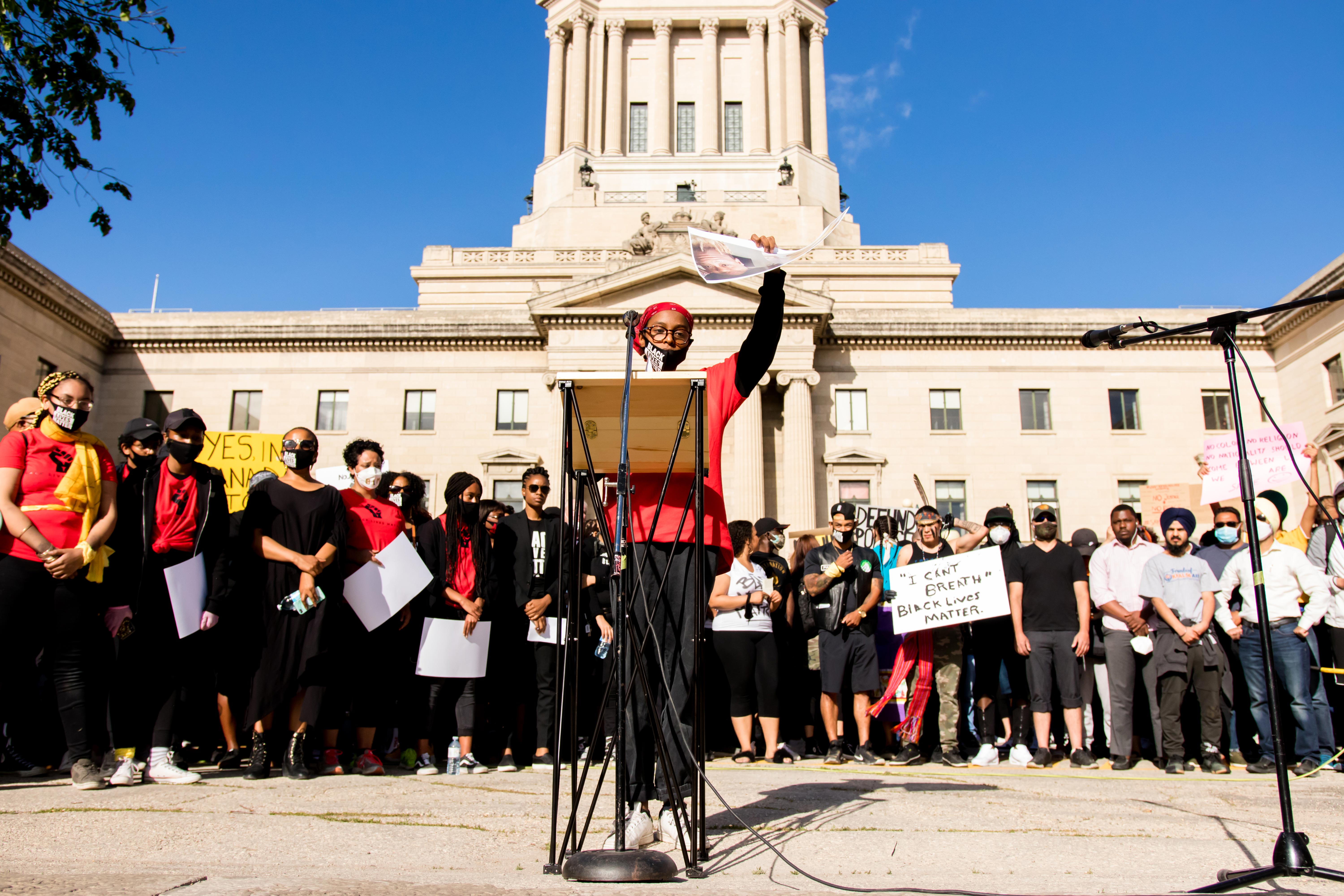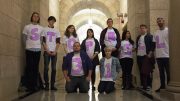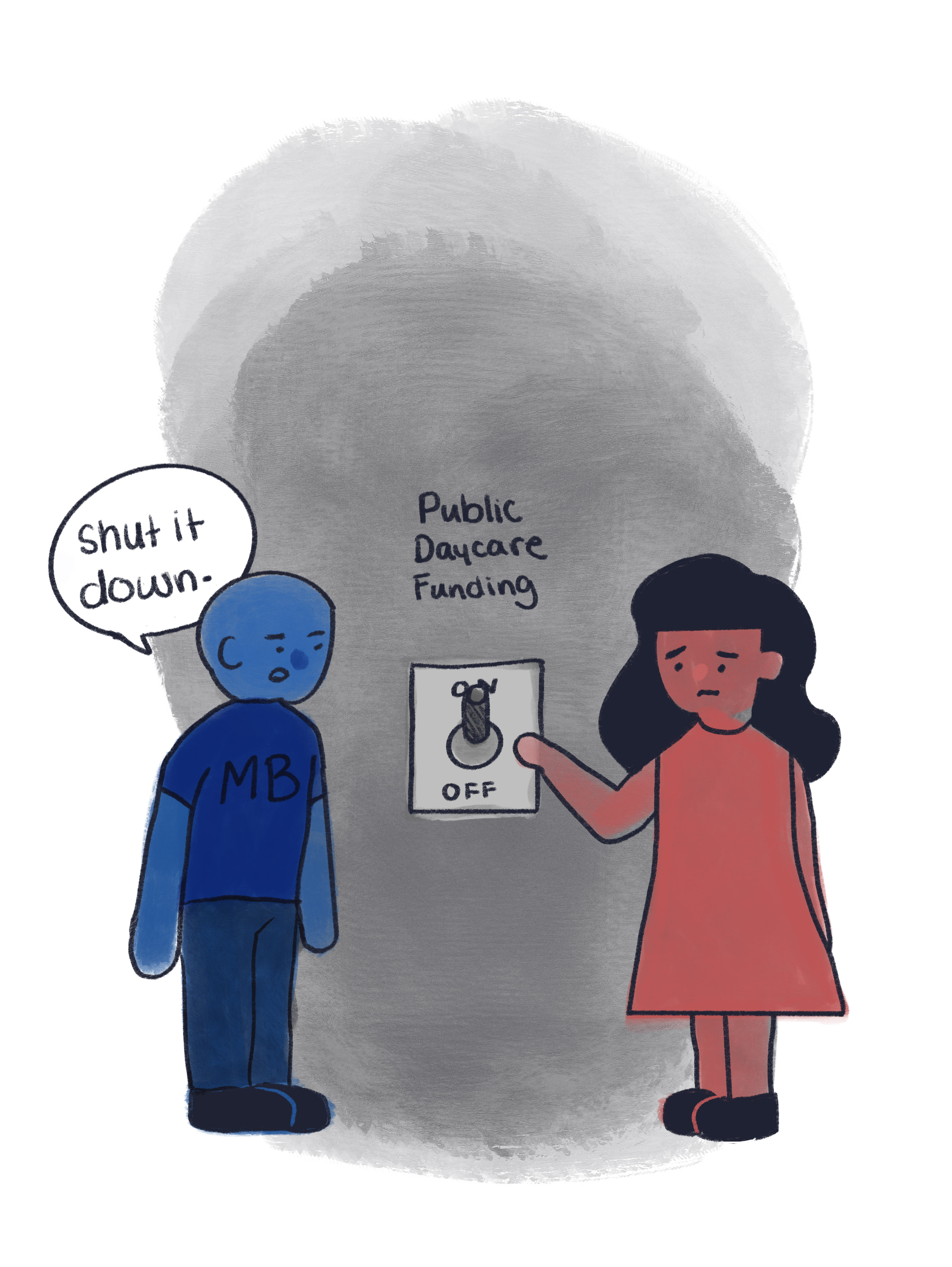Mahlet Cuff is working toward a women’s and gender studies degree at the University of Winnipeg. She is also one of the organizers involved in the Justice 4 Black Lives Winnipeg group that organized the rally at the legislature June 5.
The Manitoban spoke with them after the rally.
The Manitoban:
Why did you decide to become involved in organizing the Justice 4 Black Lives Winnipeg rally?
Mahlet Cuff:
It’s definitely something that has been on my mind for the past couple of months […] There has been a lack of organizing in the city for Black people and Black women and Black non-binary folks and queer folks as well to talk about these kinds of things and the injustices that we see in [the U.S.] but also here in Winnipeg, or in Canada in general.
I put out a call-out about a week ago […] [asking if] any Black folks want to organize to rally or protest or whatever it may be to talk about Black lives and Indigenous lives because we’re both disproportionally [victims of police brutality], racially profiled and treated terribly [compared to] our white counterparts. So, that was something I put out on Facebook and on Instagram […] and the response was outpouring, and the support of Black folks and then allies who want to be able to support and Indigenous folks who want to be able to support as well. I never expected it to be this big in the sense that people really wanted to show out and be able to help.
The Manitoban:
What did you hope to achieve, or what do you believe was achieved by holding this rally? What do you think this rally meant for Winnipeg?
Mahlet Cuff:
That’s something I’ve been processing for the last couple days […] I think what we achieved as a group of people — to be able to put this on for the community — was to be able to be represented. I think we wanted Black folks to [think], “I can see someone that looks like me speak in front of everyone and tell me that my life matters.” I think that’s something that’s been really lacking in this city […] There isn’t enough visible organizing, that people can go out in the streets and feel comfortable going out and protesting about these kinds of things and speaking about these kinds of things, too.
So, I think what we achieved is to show that Winnipeg really showed love for the Black community and the Indigenous community, but […] that rally was one day […] and this is something that [should] continue into the next couple — we hope — months and years. I hope in my lifetime, I hope in my family’s lifetime that this will not be a thing we have to go and protest, for my life and other people’s lives.
I hope we showed people that this is not the end, and this is the continuation of what anti-racist work and [working against] anti-Black racism looks like in the city.
The Manitoban:
What problems and issues do you think Black and Indigenous people face when it comes to racism by police and from the public in Winnipeg and in Canada on a local level?
Mahlet Cuff:
I think it is on all levels [from] the minimum — so, microaggressions — to the max where you are kicked out of somewhere for being Black or Indigenous. What I’ve experienced is [situations] where people think they have access to my body or my hair or telling me that I “sound white.” My name is not an English name — it’s an Ethiopian name — so people telling me they can’t pronounce it [saying] “Oh, it’s too hard, what’s your nickname?” So, it’s those kinds of things.
Then things get worse and worse […] I’m not a dark-skinned Black woman, so I think about those women in the sense of what they go through and how they are treated terribly [as opposed to] lighter-skinned women. Black men are fetishized […] and seen as violent when they’re just people trying to be people. I think about police brutality, I think about surveillance of Black people in the community, I think about being pulled over for something that isn’t even relevant and then [police officers] asking me, “Is this your car?” when they know damn well it is my car — it says my name on the insurance.
[It’s] those kinds of things […] or even more extreme than that, being arrested for something you didn’t even do and going to prison for a long time […] Or even in schools, where there are cops at high schools […]There should not be cops waiting for you at school every day. Your teachers are supposed to be there, your friends are supposed to be there.
It really shows that Winnipeg is not much better than anywhere else […] There’s a way that Winnipeg is able to hide things and brush things under the table to protect the wrong people. I think with this rally, and I think with the conversations we’re having in Canada, Winnipeg, Treaty 1 and all over Turtle Island, [the consensus in our community] is that we can’t keep brushing things under the table anymore, underneath the rug […] I am fed up, I am angry, I am sad and I am frustrated with the people in my community […]Words are just words, action means the real thing.
The Manitoban:
Could you describe the importance of non-Black and particularly Indigenous allyship in Winnipeg, where the Black and Indigenous populations are comparatively small as opposed to the white population?
Mahlet Cuff:
That’s something I have been really thinking about for the last couple months […] It is so important for non-Black people and Indigenous folks to really show up for Black people in the sense that, if I’m able to call out someone or tell someone that they’re being racist, there’s a limit and I hit a capacity where I can’t do it anymore.
So, I really hope people understand that this work is not only on us — it’s on non-Black people, it’s on Indigenous folks, it’s on the people that don’t face the brunt of anti-Black racism. You have to really show up — when you see something [racist] on Facebook, say something. If you can’t say something, tell your friend to say something if they’re more comfortable to say it. If you see something in [public] and it doesn’t look right and you’re a white person or you’re a non-Black person, you benefit from white supremacy. You have to remember that you have a place to say something. Film it, see what you can do to show the allyship, because allyship doesn’t mean anything to me if you’re not able to call out things, if you’re not able to make phone calls, if you’re not able to donate money, if you’re not able to go to rallies.
The Manitoban:
Why do you think this rally was so peaceful when some rallies south of the border for the same or a similar cause have devolved into rioting?
Mahlet Cuff:
I think Winnipeg wanted a peaceful event. I think the city wanted it to be peaceful. I think we put enough messaging out there [saying] that if you respect the organizers, the Black community, the Indigenous community, folks of colour, you’ll know that if there was a riot, that would […] marginalize people even more.
We gave the information to ensure it was peaceful, we reiterated that in our messaging very clearly and consistently every day up until the day of the rally and at the rally as well […] I think that shows the police and the city that you have to trust the community — if you don’t trust us, that’s where the disconnect happens, that’s when people riot and that’s when people cause harm to their communities.
We don’t want to cause harm […] we want to make sure our community is safe for every single person. We showed the police that we don’t need them.
The Manitoban:
Will you be holding any similar events in the future? What’s next for Justice 4 Black Lives Winnipeg?
Mahlet Cuff:
We hope so. Right now, we’re really talking about the petition, with our list of demands which outlines abolishing the police, putting more money into community not-for-profits that support Black and Indigenous youth and people of colour. I think people need to look at the petition and sign it […] Share it with your friends […] so it’s constantly circulating, not only here in Winnipeg but across Canada, so we can show the city that this is not going to be done after [June 5]. This is something that is a long-term goal for all of us […] We want to make sure Winnipeg is held accountable for their actions and make sure that Black folks are protected and Indigenous folks are protected [so] we don’t have to protest anymore.
Petition, calling out [racist behaviour] — we want people to hold other people accountable, which is what we’ve been doing all week.
We’ve been holding the city accountable, the government accountable for their actions, [holding] the police accountable. So, we hope people continue to do that, and we will, too.




